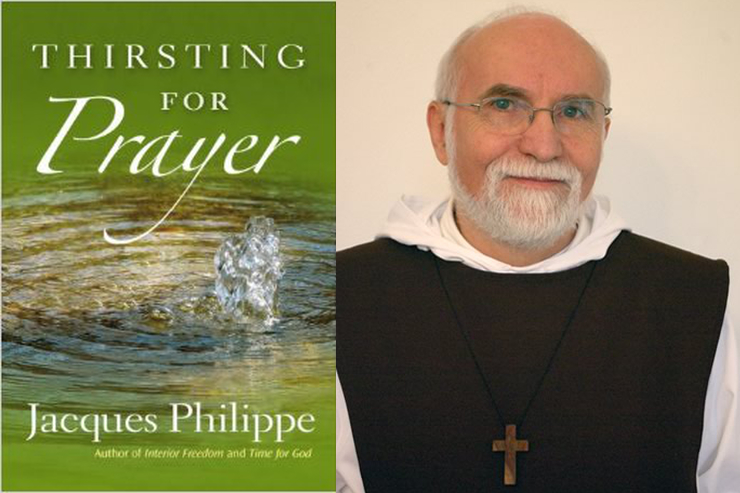Have no anxiety at all, but in everything, by prayer and petition, with thanksgiving, make your requests known to God. (Phil 4:6)
For many of us prayer doesn’t come easily. Spontaneous prayer in time of trouble or crisis often takes the form of singular pleading, “God help me.” This direct cry to Him indicates our thirst for Him. It is no less sincere than hours of meditation and contemplation; in desperation we will seek God.
Father Jacques Phillipe’s Thirsting for Prayer (Scepter Publishers, Inc.) shows us how to expand our prayer beyond those single appeals. We do thirst for prayer, but are often frustrated by our inability to put into words the desire for what we think prayer should be. The purpose of this book is to lead us to where we want to be as we attempt to converse with God. Phillipe points out that “prayer is a response to a call.” That call from God for our prayers is what drives our thirst.
The book is arranged into five parts, beginning with What Is at Stake in Prayer. Phillipe tells us that “man searches for God, but God seeks out man even more actively.” That God seeking us is difficult to grasp. Us seeking God makes more sense, but the more we pray we not only know God better, we know ourselves more. The fruits of prayer unfold slowly. Even when we are dry in our prayer, we should continue. Trying to become the patron saint of communication in a hurry will only lead to frustration. What is at stake in prayer is knowledge of ourselves and God in a unique and special way.
In the second part, Conditions for Prayer to be Fruitful, Phillipe gives us a roadmap of how we should approach our prayers. “If our prayer is genuine, it will bear fruit: it will make us humbler, gentler, more patient, trusting.” Phillipe tells us that perseverance is key; along with humility and charity. If our prayer life is is based on faith, hope and love it will only grow and become more special and necessary in our lives. Paying attention to dryness in our prayer life is crucial, but it can be a gift. To struggle through a difficult period in prayer will strengthen our faith, fill us with grace and, quite often, enlighten us as to who we are. Entering into prayer with the right attitude and humbling ourselves in the Lord’s sight is a special gift to Him. He always hears us.
The Presence of God, in the third part, teaches us that prayer is our welcoming of God by seeing God around us. Phillipe points out, that “recollection—entering into ourselves—is an essential dimension of prayer. We withdraw into ourselves in order to meet God who lives there.” Meditation on scripture is necessary as well. “Scripture is like a mirror that enables us to know ourselves truly, both the good and the bad.” Relying on the Word will lead us into a special place of prayer supported and sustained by God’s love.
In part four, Practical Advice for Personal Prayer, Phillipe stresses the importance of the time we choose for prayer and our attitude toward this time. If we only pray when it is convenient to us, we haven’t much of a foundation for consistent and fruitful prayer. So, setting a quiet time is essential. Our attitude toward our neighbor is crucial. We must pray in charity. We can’t have fruitful prayer if we’re grinding our teeth in anger, irritation and selfishness. Besides Scripture, the daily readings can inspire us to meditate and pray over particular passages. Phillipe stresses that prayer is “not a form of corporal penance” and we should position ourselves so that our entire focus is on God and not our physical selves. Sections on types of prayer including repetitive prayer, the Jesus prayer and the Rosary, are emphasized.
The book closes with Prayer of Intercession. Phillipe cites several Scripture passages on intercession and believes that “prayer of this kind is one of the most beautiful expressions of trust in God and love for neighbor.” Intercessory prayers are offered for many things. But we should also “ask God to enlighten us about the people he wishes to entrust to our prayer and our love.” We connect with God in a special, intimate way in intercessory prayer. And, of course, He does not always answer our prayers, at least, not in the way we think he should.
The information in several parts has a way of overlapping, but repeating information in a different way emphasizes those points. The reader also acquires a sense of the quiet, gentle spirituality of the author.














